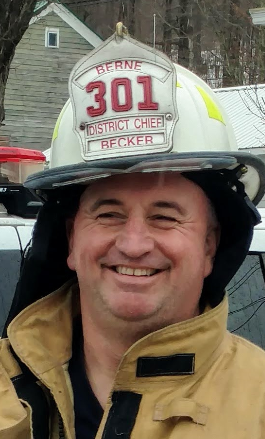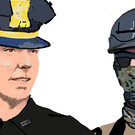Following safety protocols can be inconvenient. Not following them has left a town inconsolable.
Politics should not play a role in public safety.
We’ve seen this nationwide as science made clear that wearing masks could stem the spread of COVID-19, preventing deaths in the long run. And yet, because our former president rarely wore one and did not require masks at White House gatherings that became superspreader events or at mass rallies, many of his followers followed suit.
In June, Democrats were about twice as likely as Republicans to say that people in their community should always wear a mask — 63 percent as opposed to 29 percent, according to the Pew Research Center.
This has hurt all of us, causing more illness and death — deaths that could have been prevented.
This week, our Hilltown reporter, Noah Zweifel, broke the story on a death that hit close to home, showing how that death could have been prevented if state safety regulations had been followed.
Peter Becker, a Berne highway worker, was killed on Oct. 21 last year; he was working under a town dump truck propped up by a pneumatic jack when the truck came down on him. He was 52.
Becker was a stalwart member of the community, a former fire chief of Berne’s volunteer company. Over the years, we relied on him time and time again to tell us about the fires that had damaged homes and hurt families. He always spoke with care and compassion.
Becker risked his own safety to keep others safe.
After his death, our pages were filled with grief from mourners throughout the community and also filled with descriptions of Becker’s worth and selfless contributions.
“Peter Becker was perhaps the town of Berne’s happiest employee, always smiling, always ready to help,” wrote Berne Town Clerk Anita Clayton. “In a time of such loss and tragedy, we should reflect on what really matters in life and treat each other with dignity, respect, compassion, and empathy.”
“Peter Becker’s death was cruel and sudden, and it has devastated two families: first of course, his wife, parents, daughters, aunts, uncles, countless cousins — and then, his fire family,” wrote Berne Fire District Commissioner Mary Alice Molgard.
She called Becker “the heart of our fire company.”
We had hoped that the state labor department’s investigation of Becker’s death would find no violations, that it would find instead his death was truly an accident — we thought that would be easier for the community to bear.
Instead, the Public Employee Safety and Health Bureau has found the town’s highway department to be in violation of seven different regulatory items; each violation is considered “serious.”
These violations are described in Zweifel’s news story. Zweifel, of course, called on the people who oversee the town’s highway department — most importantly Superintendent Randy Bashwinger and also Berne Supervisor Sean Lyons — to include their views. He got no response before we published the story online on Feb. 12.
We understand these two men must be hurting.
At the time of Becker’s death, Lyons told The Enterprise that he had known Peter Becker since preschool, and he likened Becker’s death to that of a brother’s. “In fact, I knew him longer than my real brother,” Lyons said. “We were very close.”
“Pete was our community,” Lyons said, “and it will be devastating.”
“Pete was more than a worker,” Bashwinger wrote at the time. “He was a friend, and a brother to us. He always had a smile and always hugged people. This was a guy that would give the shirt off his back.
“Pete and [his wife] Robin were always supporters of the highway,” Bashwinger went on. “Robin would make food all the time. This is a guy that would come in at 3 or 4 a.m. after just fighting a fire all night the day before. I can’t express how much we hurt from his loss. Pete, we love you brother.”
We believe the best way to honor Becker is to prevent deaths like his in the future. We were gratified then, just as we were assembling our letters pages for publication, to receive a letter from Sean Lyons.
To his credit, Lyons acknowledged that the violations are serious and that they will be remedied. “What happened that day to Peter will change how everything will be done in the future to prevent it occurring again and that will be Peter’s greatest legacy,” the supervisor wrote.
We will hold him to his word and look forward to reporting on regular updates as procedures are improved and requirements are met. The public deserves a full accounting of how and why the violations occurred and how and when they will be remedied going forward.
Those who are still mourning Becker — including other members of the highway crew whose safety is also imperiled — deserve no less.
No matter how painful, it is important to report on the violations. The Public Employee Safety and Health Bureau has found Berne highway workers did not receive essential training; that the town did not conduct required inspections; and that needed procedures were not developed, documented, and used.
The state’s labor department has mapped out a schedule by which each of the seven serious violations must be remedied — the latest being May 4 of this year — after which a penalty of up to $200 per day will be imposed.
The penalty that matters most, though, isn’t monetary. Becker’s family and community have already been penalized beyond measure with his death.
We hope this serves as a wake-up call for any of our local highway superintendents who may not be following the required protocols. Now — before tragedy strikes — is the time to monitor compliance.
Remember the words the Berne town clerk wrote in the wake of Peter Becker’s death: “In a time of such loss and tragedy, we should reflect on what really matters in life and treat each other with dignity, respect, compassion, and empathy.”
The way to do that now is for responsible town leaders, including the highway superintendent, to be transparent about what went wrong and to correct the violations as soon as possible. This is essential for restoring public trust. It is also a matter of life and death.



